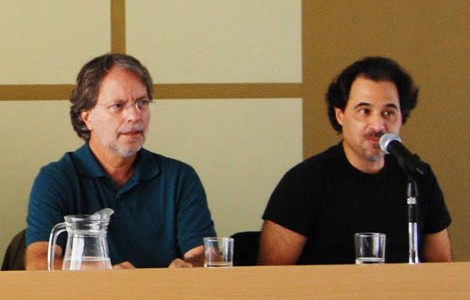 “The network of public libraries was one of the things that has been done well in Portugal in recent years,” Angolan writer José Eduardo Agualusa said yesterday at the Manuel Teixeira Gomes Municipal Library, in Portimão.
“The network of public libraries was one of the things that has been done well in Portugal in recent years,” Angolan writer José Eduardo Agualusa said yesterday at the Manuel Teixeira Gomes Municipal Library, in Portimão.
Agualusa and his Mozambican friend Mia Couto were this Thursday, at the end of the afternoon, in Portimão, and later at night in Faro, at Leya no Pátio bookstore, to present her two most recent books, “A Confessão da Leona” (Mia) and “Theory General of Oblivion” (Agualusa).
Always in a good mood, despite the real marathon that the two renowned Portuguese-speaking authors have been doing in Portugal in recent days, Agualusa and Mia spoke in front of a crowded room, with people standing, despite the heat that was felt. “The Troika doesn't let us buy an air conditioner”, commented the mayor Manuel da Luz.
José Eduardo Agualusa, still referring to public libraries, added that “this network has changed the country, as I have seen in my travels, but it has even changed the good situation of Portuguese literature. Developed countries are countries with libraries and books».
Zeferino Coelho, an almost mythical editor in Portugal, also present at the session at the Library of Portimão, explained that, since it was a unique opportunity to bring together two of the greatest Portuguese-speaking writers of our time, friends who know each other well, then each one of them would present the other's book.
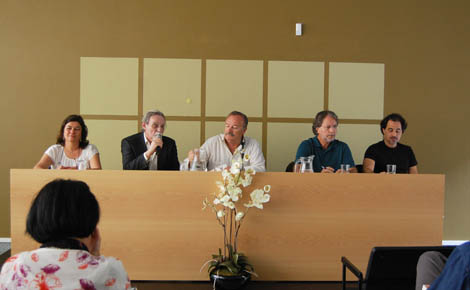 And that's what Agualusa and Mia did, to reach the conclusion, in the end, that both, although telling different stories, spoke more or less of the same thing: of identity.
And that's what Agualusa and Mia did, to reach the conclusion, in the end, that both, although telling different stories, spoke more or less of the same thing: of identity.
The first to speak was José Eduardo Agualusa, who introduced Mia Couto and her novel “A Confessão da Leona”. “I met Mia because of the books”, recalling that this happened when I was still a journalist for the Expresso. “It was an emotion. I discovered a completely original voice and felt that this was the writer we needed", an author with "an illuminated, transparent voice, with absolutely extraordinary stories, stories that I would have liked to tell". Mia Couto's work and her personal encounter that turned into friendship was, therefore, for Agualusa, «recognition more than knowledge».
As for the most recent book by the Mozambican writer, Agualusa considered that «this is another Mia Couto, it is another project». "It is rare for writers who, having built a path, which ensured them success in sales and criticism, have the courage to break with that path". Because, explained Agualusa, in "The Confession of the Lioness" "you won't find the Mia Couto of neologisms, of perhaps excessive creation of new words."
But that, according to the Angolan writer, does not diminish the new work in any way: «in my opinion, this is Mia's best book».
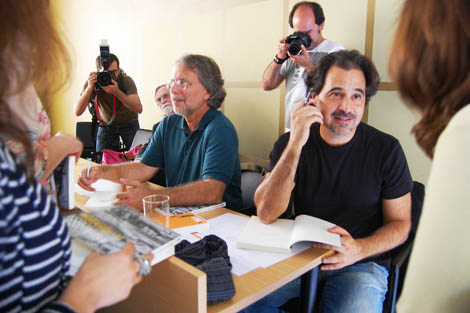 In "A Confessão da Leona", stamped by Editorial Caminho, Mozambican writer Mia Couto addresses a real event – the successive deaths of people caused by lion attacks in a remote region in the north of his country – and from there weaves a surprising work that speaks of lions and hunting, but also of men and women living in extreme conditions.
In "A Confessão da Leona", stamped by Editorial Caminho, Mozambican writer Mia Couto addresses a real event – the successive deaths of people caused by lion attacks in a remote region in the north of his country – and from there weaves a surprising work that speaks of lions and hunting, but also of men and women living in extreme conditions.
“Is it a book about hunters, about lions? Not! It's about the human condition and the female condition," "how certain traditions are disrespectful to women."
Then it was Mia Couto's turn to present Agualusa's “General Theory of Oblivion”, edited by Don Quixote. The Angolan writing places his novel in Luanda on the eve of independence, which took place in 1975: a Portuguese woman, terrified of the evolution of events, erects a wall separating her apartment from the rest of the building – from the rest of the world. For almost thirty years she will survive with difficulty, like a castaway on a desert island, watching around Luanda grow, exult, suffer.
Mia Couto recalled that he and Agualusa have, from the outset, "a shared condition: we are both Africans, of Portuguese origin." «There are ghosts, obsessions here, which are common», namely that of writing about «the invention of identity, how we are made of various selves, and also the invention of a past, of a certain memory».
Mia considered that this is also "José Agualusa's best book". “It looks like a book about Luanda, but it isn't. It's about humanity, about all of us». The book, he added, talks about "a woman who becomes a recluse, which is a metaphor for all of us", who live in "helplessness in the face of a world in profound change."
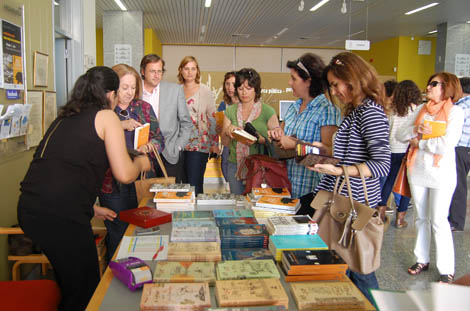 «I read the book in one sitting. I was very moved», confessed Mia Couto.
«I read the book in one sitting. I was very moved», confessed Mia Couto.
The Mozambican writer also recalled another condition that he shares with Agualusa: «each one of us carries Angola or carries Mozambique, as something that is common to us». Despite its European genetic origins, Africa is ultimately what unites Mia and Agualusa.
A condition that, incidentally, the two writers also shared with many of the people who filled the auditorium of the Municipal Library of Portimão. As one of the readers in the audience recalled, "almost half of the city of Portimão is made up of people who came from Moçâmedes, with the decolonization."
Manuel da Luz, mayor, would recall, in closing, that Mia Couto and José Eduardo Agualusa are “two people who help us to recognize our identity: we are the result of the melting of cultures, in which the African component is very important”.
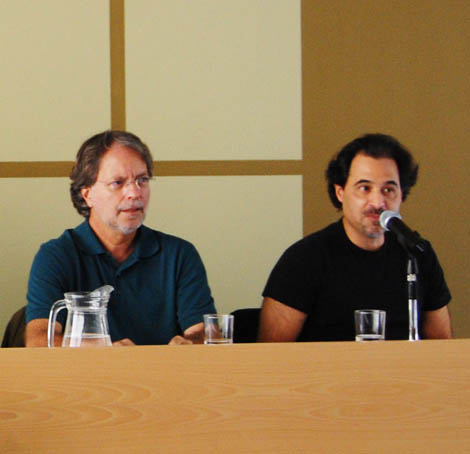
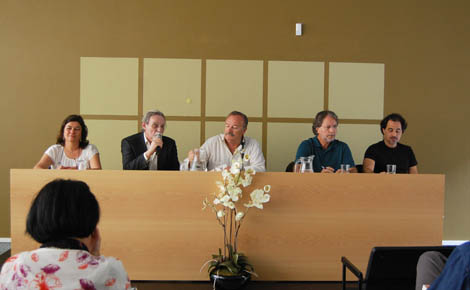
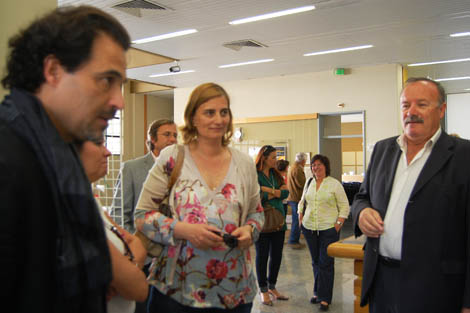
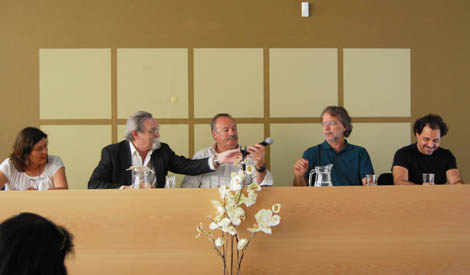
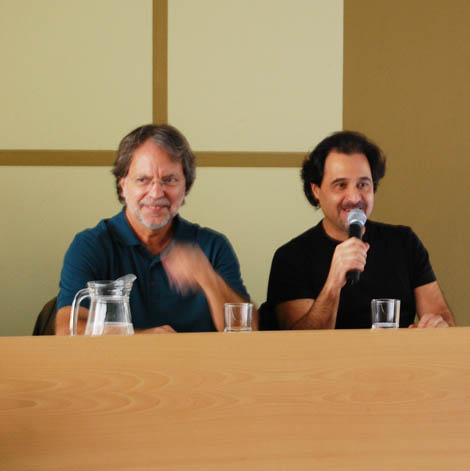
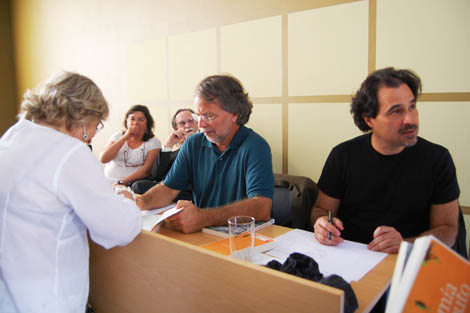
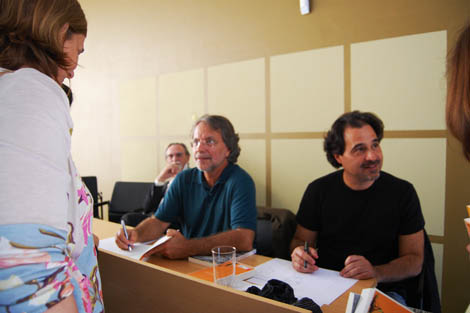
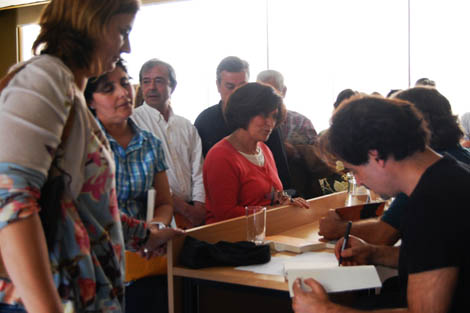
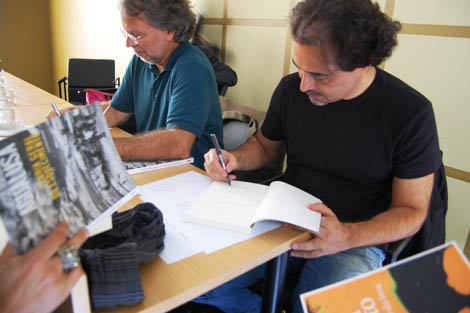
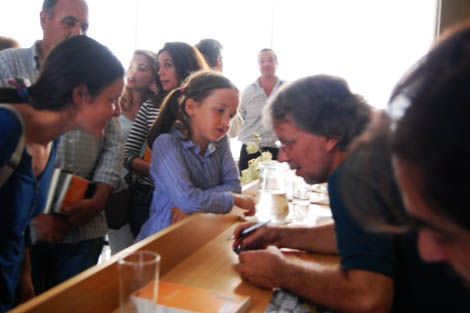


















Comments